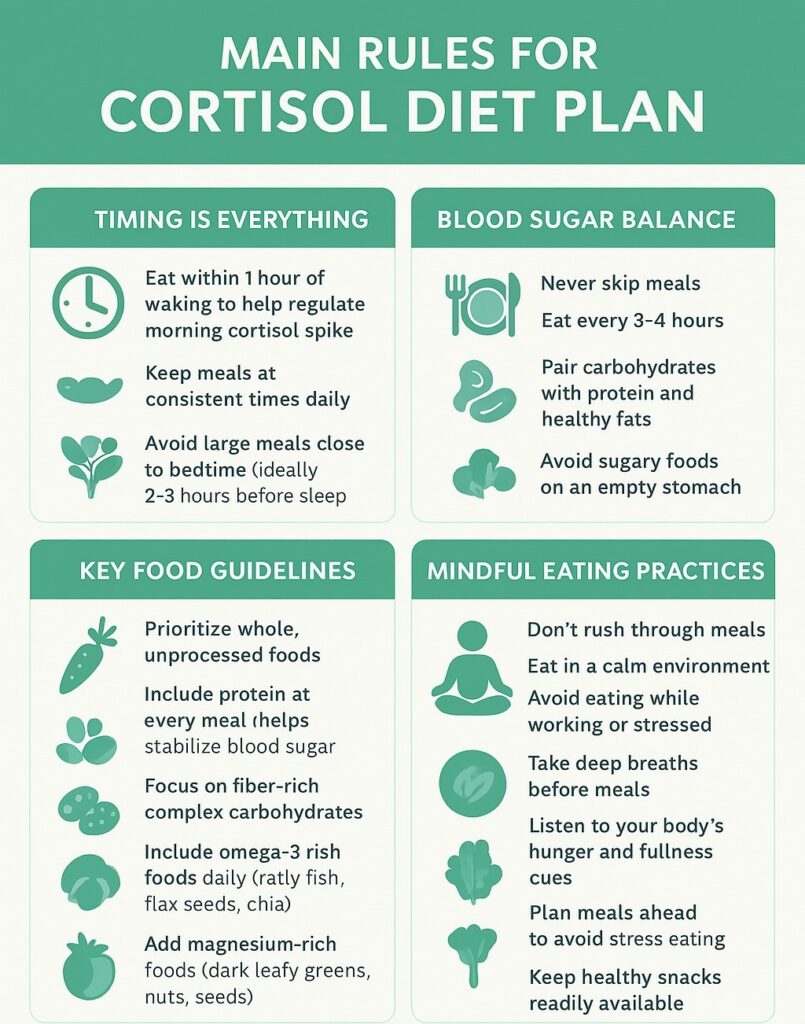Do you know what cortisol is and how do you manage a cortisol diet plan?
Cortisol is a stress hormone released by the adrenal glands. It deals with stressful situations in your body, as your brain triggers the release of this hormone through the sympathetic nervous system, the “fight or flight” system in response to many different kinds of stress.
While the short-term release of cortisol can help you to run immediately from danger, when cortisol levels are too high for a long period of time, this may lead to several health issues like weight gain and some chronic diseases.
Main Rules For Cortisol Diet Plan
Timing Is Everything
Eat within 1 hour of waking to help regulate morning cortisol spike
Keep Meals At Consistent Times Daily
Avoid eating large meals close to bedtime (ideally 2-3 hours before sleep)
Blood Sugar Balance
- Never skip meals
- Eat every 3-4 hours
- Always pair carbohydrates with protein and healthy fats
- Avoid sugary foods on an empty stomach
Key Food Guidelines
- Prioritize whole, unprocessed foods
- Include protein at every meal (helps stabilize blood sugar)
- Focus on fiber-rich complex carbohydrates
- Include omega-3 rich foods daily (fatty fish, flax seeds, chia)
- Add magnesium-rich foods (dark leafy greens, nuts, seeds)
Mindful Eating Practices
- No rushing through meals
- Eat in a calm environment
- Avoid eating while working or stressed
- Take deep breaths before meals
- Listen to your body’s hunger and fullness cues
- Plan meals ahead to avoid stress eating
- Keep healthy snacks readily available
- Prepare backup meals for busy days
Food Recommendations
- Foods to Minimize
- Refined sugars and processed carbs
- Excessive caffeine
- Alcohol
- High-sodium foods
- Artificial sweeteners
- Foods to Emphasize
- Dark leafy greens
- Fatty fish
Nuts And Seeds
- Whole grains
- Fermented foods
- Vitamin C-rich fruits
Lean Proteins
- Healthy fats like avocades and olive oil
- supplements.
- Enhance your diet with
- Consider Vitamin C in the morning
- Include adaptogenic herbs when appropriate
- Focus on Magnesium in the evening

What Happens When Cortisol Is High?
Moderate to high cortisol levels may lead to several health issues, such as
Chronic Disease
If your cortisol level is raised for a long period of time,it may increase your risk of various health issues like high blood pressure, heart disease, type 2 diabetes, osteoporosis, and other chronic diseases.
Weight Gain
Cortisol may increase your appetite and provide a signal to the body to shift metabolism that can store fat.
Lack Of Energy Or Difficulty Sleeping
Cortisol can interfere with your sleep hormones, and can impact sleep quality and length of your sleep.
Difficulty Concentrating
High levels may cause “brain fog,” or trouble to focus and lack of mental clarity.
Impaired Immune System
If your cortisol is increased to a high level,it is more difficult for the immune system to fight infections.
Cushing Syndrome
In rare cases, very high cortisol levels can lead to Cushing syndrome, a rare but serious disease.
Lack Of Energy
High cortisol levels can increase feelings of fatigue.
Recommendations
Health professionals can help in determining the cause of high cortisol levels and recommend treatments too.
You can also try some lifestyle habits that can help in managing your cortisol levels.
Here are some recommendations:
Get The Right Amount Of Sleep
Prioritizing sleep may help in reducing cortisol levels. Some chronic sleep problems such as obstructive sleep apnea, insomnia, or shift work are associated with higher cortisol.
Do you know?
Insomnia causes difficulty in sleeping. It can result from many factors, which includes stress and obstructive sleep apnea. This can result in increasing circulating cortisol, which affects your hormone patterns, energy levels, and other facets of your health on a regular basis.
Those on rotating shifts may not have good health outcomes, such as
- Obesity
- Heart disease
- Type 2 diabetes
- Worsened mental health
If you are on a night shift or rotating shift during your office/ working hours, you do not have a complete control over your sleep schedule, but there are some things you can do to optimize your sleep schedule
Have A Bedtime Routine
- Establishing a consistent bedtime routine (e.g., shower, read a book, etc.) can help your brain and body start winding down.
- Go to bed and wake up at the same time each day A regular sleep schedule is one of the most effective ways to improve sleep.
- Exercise earlier in the day
Exercising regularly can help in improving your sleep quality but should be done at least 2–3 hours before bedtime.
- Limit your caffeine intake
Avoid yourself to consume caffeine-containing food and drinks around 6 hours before bed.
- Avoid nicotine and alcohol
Both substances can affect sleep quality and duration.
- Limit exposure to bright light at night
Around 45–60 minutes before sleep, reduce your exposure to bright and blue light. Instead of reaching for your phone in bed, try to read a book or listen to a podcast.
- Go to bed in a quiet room
Limit interruptions using white noise, ear plugs, and silencing your phone.
- Take naps
If shift work shortens your sleep, napping can reduce sleepiness and prevent a sleep deficit. Napping may worsen sleep quality in non-shift workers, especially if you take naps within 7 hours of bedtime.
Foods To Eat When You’re Stressed
- Warm, Soothing Foods
If you want to conquer stress, a food’s nutrient profile may be just as essential for your health as how it makes you feel. Take a peaceful, warm cup of tea, for instance, says Sandra Meyerowitz, MPH, RD, an online nutrition coach and the owner of Nutrition Works in Louisville, Kentucky, who is specialized in food sensitivities, food allergies, and nutrigenomics.
If you sip a warm drink ,it will have a soothing effect regardless of the flavor but certain herbs have been shown to have a relaxing effect on their own, Meyerowitz says. For instance, one study suggested that chamomile may help in reducing anxiety just by helping in rewiring the body’s stress response and increasing the production of the feel-good hormones serotonin and dopamine.
Foods That Help In Reducing Cortisol Level
- Fruits
Avocado,Banana,Blueberries
- Veges And Tubers
Artichokes, Brocolli,Spinach,Swiss Chard,Sweet Potato
- High Quality Protein
Eggs,Organ Meats,Salmon, Shellfish
- Nuts And Seeds
Chia Seeds,Sunflowe Seeds, Walnuts
- Probiotics
Kimchi
- Fresh Herbs
Garlic ,Parsley
Cortisol Diet Plan

Summary
If you practice good sleep hygiene,it can help in keeping cortisol in a normal rhythm. If you keep a consistent sleep schedule, avoide using caffeine 6 hours before bed, and stay off from your cell phone right before bed are proven to be effective strategies.

















